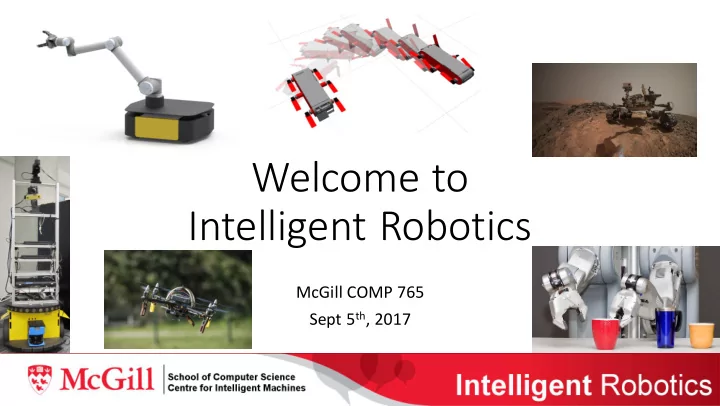

Welcome to Intelligent Robotics McGill COMP 765 Sept 5 th , 2017
Robotics Today • The intersection of rocket science and machine learning • A collaborative, team-oriented discipline practiced by children, high- school teams, DIY’ers , start- ups and the world’s largest corporations • A global industry predicted to become one of the largest sectors in the next decades • Our best tool to explore space and to improve productivity globally • Our main focus : an active, growing research discipline that attempts to solve the problems introduced by the above needs
A quick tour: robotics industry
A quick tour: high school robotics FIRST ( F or I nspiration and R ecognition of S cience and T echnology) was founded in 1989 to inspire young people's interest and participation in science and technology. Based in Manchester, NH, the 501(c)(3) not-for-profit public charity designs accessible, innovative programs that motivate young people to pursue education and career opportunities in science, technology, engineering, and math, while building self- confidence, knowledge, and life skills. FIRST is More Than Robots. FIRST participation is proven to Founder: encourage students to pursue education and careers in STEM- Dean Kaman related fields, inspire them to become leaders and innovators, and enhance their 21 st century work-life skills. Read more about the Impact of FIRST. 2016 Finals Competition Video
Introductions • I’m David Meger: • 3 rd year as Professor at McGill • Co-Director of the Mobile Robotics Lab • Specialties are visual perception for robotics and robot systems that learn (some slides and highlights coming soon) • I’m happy to meet you! Can you tell me: • If you have any previous robotics experience • What do you hope to learn in the course • Do you have any questions and concerns (can be postponed to the end of lecture if you want to wait and see)
frying pan book orange …
Curious George’s view of the world
Adaptation to changes
Utilizing learned dynamics • Dynamics model uncertainty allows detection of changes • Rather than re-learning, attempt a “lazy” solution, minimally changing the previous model and controller
Course Plan • Learning Outcomes: • Derive, analyze and compare important robotics algorithms • Familiarity with broad trends and ideas in current research • Ability to program for intelligent robots • Research experience in one focused project area • Format: • My lectures cover history, important techniques and a snapshot of research • Associated assignments and exercises for practice • You give presentations on specific selected papers • Projects (single or group)
Topic Outline • The basic tools: • Modern concepts and research: • Spatial representations • Learning for robotics • Modeling motion and perception • Control using learned models • Probabilistic State Estimation • Learning from demonstration • Geometric motion planning • Hierarchical planning systems • Classical control • End-to-end learned systems • Decision making under uncertainty • Cloud and collaborative robotics • Multi-robot teams • Human-robot teams • Safety in robotic intelligence
Textbooks and Resources • Optional texts: • Probabilistic Robotics by Thrun, Burgard and Fox. • Computational Principles of Mobile Robotics: Dudek and Jenkins. • Gaussian Processes for Machine Learning: Rasmussen and Williams • Most material online: • Required reading of recent papers • Robotics software package: mainly ROS • Simulated robots: Gazebo, OpenAI Roboschool and others • Datasets, project pages and robot-brains!
Assignments and Presentations • 3 assignments: • I pick the problems: 1) Location Estimation; 2) Control With a Known Model; 3) Path Planning Under Uncertainty • You pick an algorithm: from class or another you find • Implement on a simulated robot: provided, that you find or build from scratch • Present your results as a write- up: It’s about what you learned, not that your code must always work perfectly • Present research papers: • Everyone will do 2 throughout the term. One from a required list and one that you pick as part of your project (to be continued…)
Access to simulators and robot hardware • JACO Manipulator Robot • Aqua Swimming Robot • Husky Ground Robot • Quadcopter Flying Robot • Simple Walking Robot
Course Project • The main focus of the last weeks of the course • Select a recent research paper, or a group of related papers. • Present to the class. • Hands- on work with the paper’s key technical points: • Experiment with their implementation • Re-implement in your own code • Perform the derivations from scratch • Attempt a research extension • Demos and discussions to end the term
Monday morning for a robot… I am powered on and wonder Where am I? I wander for a bit, then form a Plan Under Uncertainty that will most likely for the kitchen. I know how to Control my arm to grab the coffee mug, and I can even refine my behavior once I hold it by quickly Learning a Dynamics Model - it’s half full. Now to make my delivery. My user is usually in the garage at this time of day, and so I Plan a Geometric Path though the house, navigate ther safely and put down the cup. I Perceive Visually that my user has purchased a new tool. After a few minutes, I have Learned from Visual Demonstration about how to use this, and feel ready to give it a try
Recommend
More recommend